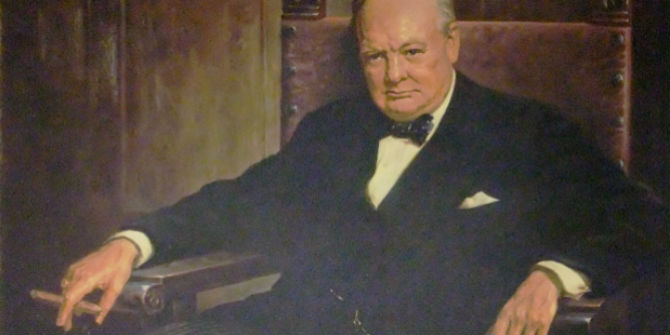 Since 2016, a number of high profile ‘Revocateurs’, among them Tony Blair, Alastair Campbell and Andrew Adonis, have appealed for a fresh referendum on the EU in Britain. Leaving aside the complex practicalities and politics of the ‘neverendum’ idea, Oliver Daddow (University of Nottingham) argues there is no evidence either that Revocateurs were the victims in Act One of the ‘Britain and Europe’ story, or that they possess the credibility to play the heroes of Act Two. Revocateurs need to have more regard for history as it happened, not as they choose to rewrite it now.
Since 2016, a number of high profile ‘Revocateurs’, among them Tony Blair, Alastair Campbell and Andrew Adonis, have appealed for a fresh referendum on the EU in Britain. Leaving aside the complex practicalities and politics of the ‘neverendum’ idea, Oliver Daddow (University of Nottingham) argues there is no evidence either that Revocateurs were the victims in Act One of the ‘Britain and Europe’ story, or that they possess the credibility to play the heroes of Act Two. Revocateurs need to have more regard for history as it happened, not as they choose to rewrite it now.
Narratives of British exceptionalism were not the sole preserve of the Leave campaign. They had been the stock-in-trade of pro-EU British politicians for decades. There was no compelling pro-European message in 2016 because supposed pro-Europeans had for decades been content to communicate mixed messages on a low-salience issue. The referendum, however, exercised the British public and smoked out the weakness of this approach. Asking the people to accept the logic of Eurosceptic discourse but vote to Remain was a strange contract: some might say counter-intuitive bordering on the illogical. The Leave side’s anti-establishment, anti-elite messages targeting the ‘ordinary voter’ with messages around sovereignty, immigration and ‘control’ cut through much better with voters.
The tradition of British exceptionalism is centuries old and has adapted seamlessly to changing policy contexts and challenges. Succinctly, it originated in the idea that Britain required a free hand in Europe to pursue liberal free trade practices, in the 19th and early 20th century through imperial expansion. This meant imprinting on British foreign policy a ‘limited liability’ approach towards Europe, as opposed to a wholehearted ‘continental commitment’. The supposed uniqueness of Britain’s past, present and future destiny ran through a panoply of British identity constructions setting it apart from Europe: all were rooted in the spatial geopolitics of its ‘island story’. ‘Europe’ in this tradition is a choice for Britain, not a necessity.

The most complete iteration of British exceptionalism was articulated after the second world war by Winston Churchill, who in 1948, saw Britain operating at the centre of three circles of power and influence: Empire, the ‘English-speaking peoples’ (Anglosphere) and, very much last, Europe. Clement Attlee, then Labour’s post-war prime minister, did not take much convincing. His post-war government and Churchill’s 1951-55 administration met Europe’s integrative ventures very frostily, harnessing a defence of British sovereignty to the idea that the schemes would not work, especially not without Britain’s involvement. By the time Britain had reluctantly decided to throw in its lot with Europe in the 1960s, Charles de Gaulle twice vetoed Britain’s (England’s as he called it) membership of the original European Community (EC), because: ‘She has in all her doings very marked and very original habits and traditions’.
De Gaulle’s indictment in 1963 indicates that British exceptionalism was not just an ascribed identity, but one achieved through instinctive foreign policy practices after 1945. It might have been supposed that Britain’s accession to the EC would have created a ‘turning point’ or opportunity space in which a more comfortably ‘European’ identity would be devised and sold to the public. However, membership proved to be a temporary exception to the limited liability rule, during which the European element of Britishness was never truly embraced. Furthermore, even some of the most vaunted pro-Europeans from the time, including Edward Heath, treated membership as a tactical shift in Britain’s global strategy, as much as a chance to create a fully Europeanised identity.
Britain’s membership years from 1973 thus saw the historical ‘outsider’ try but fail to become less ‘awkward’ in the conduct of its European policy, but without anything in the way of a sustained public campaign to educate or inform the public of the role the EC/EU played in British national life. Space precludes comprehensive coverage of how Britain secured its ‘privileged terms of membership inside the EU’, but the steps included Margaret Thatcher’s budget rebate, Major’s Maastricht opt-outs, Blair’s bashing of the European ‘superstate’, and David Cameron’s self-styled ‘veto’ of the 2011 Fiscal Compact Treaty.
Ivan Rogers, Cameron’s EU ambassador, has remarked that in 2016, with Britain ‘in the EU but outside the Eurozone’, it had achieved an uneasy yet ‘special’ status – one rooted in the exceptionalist ideal and expressed discursively by political ‘double-speak’ on Europe. Some of the most progressive British governments, in which many of today’s Revocateurs cut their teeth, could occupy pro-European or Eurosceptic subject positions depending on which speech, or which bit of a single speech, one quoted. Take these words from Gordon Brown, from a 1997 address on the ‘British Genius’: ‘I believe that we should have the confidence to engage with Europe and make it better and – dare I say it – more British’. By 2016, the British people, not to mention Britain’s EU partners, were entitled to ask: is this the best pro-Europeans can do?
In sum, it is something of a leap of faith to imagine that today’s Remainers – yesterday’s Eurosceptic pro-Europeans (an intentional label) – have the public trust, credibility or indeed the capacity to construct a compelling narrative that would swing a public vote against Brexit, whether the plebiscite took place on the government’s final negotiated deal or membership per se. In many significant ways, the Revocateurs were the architects of their own downfall. The referendum ship therefore sailed long ago, however much Revocateurs might wish to retell the history in their favour.
This post represents the views of the author and not those of the Brexit blog, nor the LSE.
Oliver Daddow is Assistant Professor in British Politics and Security at the University of Nottingham. He is the author of Britain and Europe Since 1945 (Manchester University Press, 2004), New Labour and the European Union (Manchester University Press, 2011) and International Relations Theory (SAGE, 2017). He edited Harold Wilson and European Integration (Frank Cass, 2003), co-edited British Foreign Policy: The New Labour Years (Palgrave Macmillan, 2011), co-edited Interpreting Global Security (Routledge, 2014) and co-edits the textbook PoliticsUK (Routledge, 2018). He tweets @oliver_daddow.
‘Brexitannia’: an unsettling, beautiful insight into post-referendum UK







Some good points here. No matter what experts may say or feel, the only way to counter Brexit democratically will be to turn round the deep-rooted Euro-scepticism among the British public.
This is a big ask, especially as how the political elite has ignored the “man in the street” on the question of EU membership since British entry in 1973.
Compare the experience of the UK with that of the Irish Republic for example, which joined the EEC at the same time as the UK in 1973. At each key new stage in European co-operation (Single Market Act, Maastricht, Amsterdam, Lisbon,etc.) the Irish public has had to give it’s consent in a national referendum.
Thank you Friedrich, I agree with your analysis. This was coming for a long time. Not even with hindsight can it be seen that some of the above named enabled British Euroscepticism, rather than providing leadership against it. I find their current manic enthusiasm for Remain rather galling and about 20 years too late! Some form of guilt complex in operation?
Excellent piece of analysis; Britain is different from the rest of Europe by virtue of its geography and history. The historical and psychological roots of British exceptionalism are deeply ingrained. It would take a major national trauma such as wartime defeat or foreign occupation to change this, in my opinion.
Glad you enjoyed Stephen, I was equally surprised that Cameron felt he could overturn such long standing interpretations of Britain’s place in Europe and the world in the space of a few short weeks, up against a very compelling Leave counter narrative (whatever its rights or wrongs).
In other words it is David Cameron who must go down in infamy for calling this unnecessary referendum in the first place. He had some strengths as PM but a major fault – leading in the end to his political demise and a traumatic situation which will afflict our country for decades to come – was that he always thought he could “wing it”. This time he couldn’t.
A little verbose, but simply put British politicians have been lazy over the years and blamed the EU for problems that were not the fault of the EU rather than take the blame themselves which is where it should have been. They cannot then complain when referendum voters remembered that and voted to leave. I would agree with that analysis as far as it goes. Not all remainers can be tarred with that brush though. He ignores even the work of a committed pro-EU politician who was a driver towards the creation of the single market – Margaret Thatcher. Yes she had a price in the rebate, but that was fair.
https://www.facebook.com/notes/andy-wheeler/notes-on-progress-in-leaving-the-eu-by-andy/10155657856899332/
Thanks for your comment Andy. I agree up to a point about Thatcher, who I’ve written on elsewhere. She was pro-EEC in 1975 and pro single market in mid 1980s, but later in life, especially post resignation, I wouldnt have her down as a pro European. As with many long standing politicians, there was no ‘one’ Thatcher, only what we now make of her.
True Thatcher had criticisms of the EU, but then no one ever claimed that the EU was perfect, and the EU has moved to correct many things due to valid criticism. I’ve always found that what politicians do is a much better guide to them than what they say, especially what they say when out of office. Incidentally, I voted with her in 1975, maybe the last time I did! My main point was that many on the pro-EU side did not carry the baggage of having unfairly criticised the EU. Perhaps it was more that they had a balanced, more nuanced, position that meant they came across to the public as less powerful speakers, only appealing to the informed, already mainly pro-EU, voter. The saddest thing about the referendum to me was the clear exposure of painful rifts in British society, which the whole process appears to be making worse. I do not believe that simply leaving the EU can possibly heal those rifts.
Clearly the author is right to point out that nothing like enough was done to get across the benefits of EU membership during the 40 years of UK membership albeit the preponderance of euroscepticism approaching at times euro-hatred in most British newspapers was not easy to counter. As we all know Boris Johnston’s curtailed journalistic career with the Telegraph was based on this sort of stuff. Continental newspapers and other media regularly contain constructive coverage of EU matters including parliamentary debates etc. The UK media? Hardly anything.
Thanks Denis. I agree that the unique UK media market has a huge role to play here. It was a powerful structuring factor and Johnson’s role, as you say, is particularly compelling. There’s a great book from the late 1990s, by Anderson and Weymouth, ‘Insulting the Public’ which looks at the early stages of the growth of media Euroscepticism.